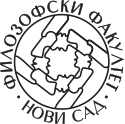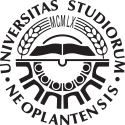15KKKK23 - Culture of Communication and Media
| Course specification | ||||
|---|---|---|---|---|
| Course title | Culture of Communication and Media | |||
| Acronym | 15KKKK23 | |||
| Study programme | Comparative Literature with Literature Theory | |||
| Module | ||||
| Type of study | first degree undergraduate academic studies | |||
| Lecturer (for classes) | ||||
| Lecturer/Associate (for practice) | ||||
| Lecturer/Associate (for OTC) | ||||
| ESPB | 6.0 | Status | ||
| Condition | / | Oblik uslovljenosti | ||
| The goal | Introduction to the key concepts of communication, information and mass media. The course provides students with the knowledge of basic journalist genres, its modalities, and specific aspects of different media. Students acquire the skill of creating basic forms of journalistic writing. | |||
| The outcome | Students are able to demonstrate the understanding of important points in communication, information and mass media, as well as the skill to create basic forms of the main journalism genres. | |||
| Contents | ||||
| Contents of lectures | Defining communication, information and mass media. Journalistic genres. Forms, types, and rules of journalistic writing. Factual, analytical and publicist genres: news, report, article, column, review, interview (statement, survey, press conference, round table, debate), travelogue, coverage, feature; headlines; radio and TV announcement. | |||
| Contents of exercises | Practice in journalism: distinction and analysis of basic informative, analytical and publicist genres. Forming adequate genres. | |||
| Literature | ||||
| ||||
| Number of hours per week during the semester/trimester/year | ||||
| Lectures | Exercises | OTC | Study and Research | Other classes |
| 2 | 2 | |||
| Methods of teaching | Lectures, textual analysis, interpretation, demonstration, comparative approach. | |||
| Knowledge score (maximum points 100) | ||||
| Pre obligations | Points | Final exam | Points | |
| Activites during lectures | 10 | Test paper | ||
| Practical lessons | 10 | Oral examination | 70 | |
| Projects | ||||
| Colloquia | ||||
| Seminars | 10 | |||

